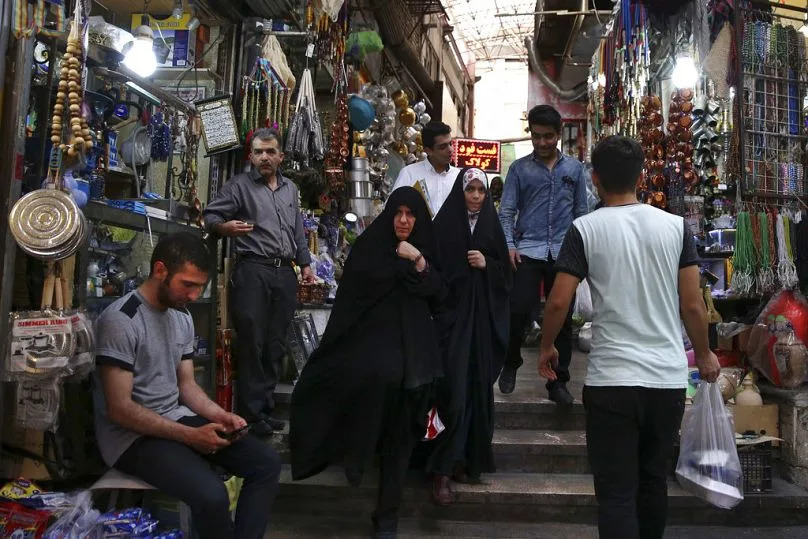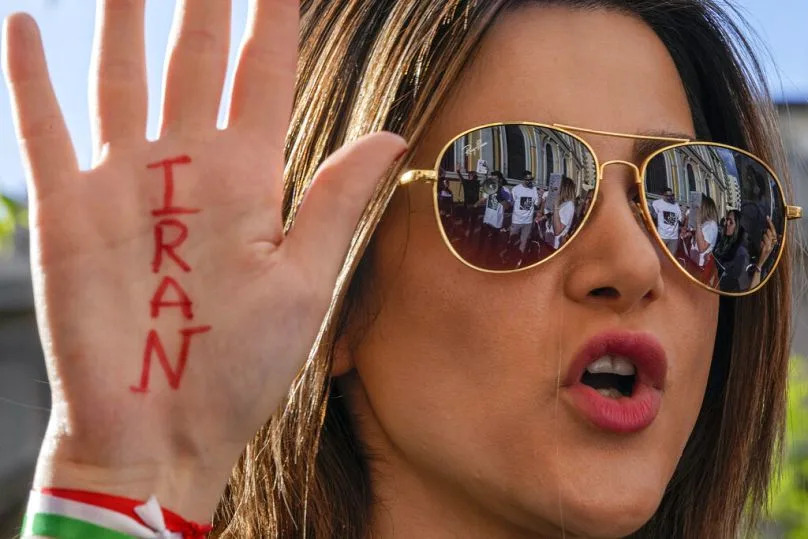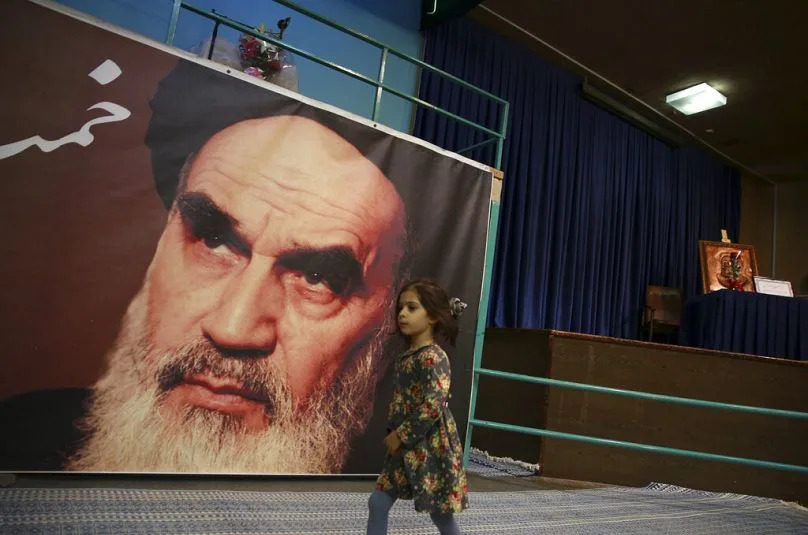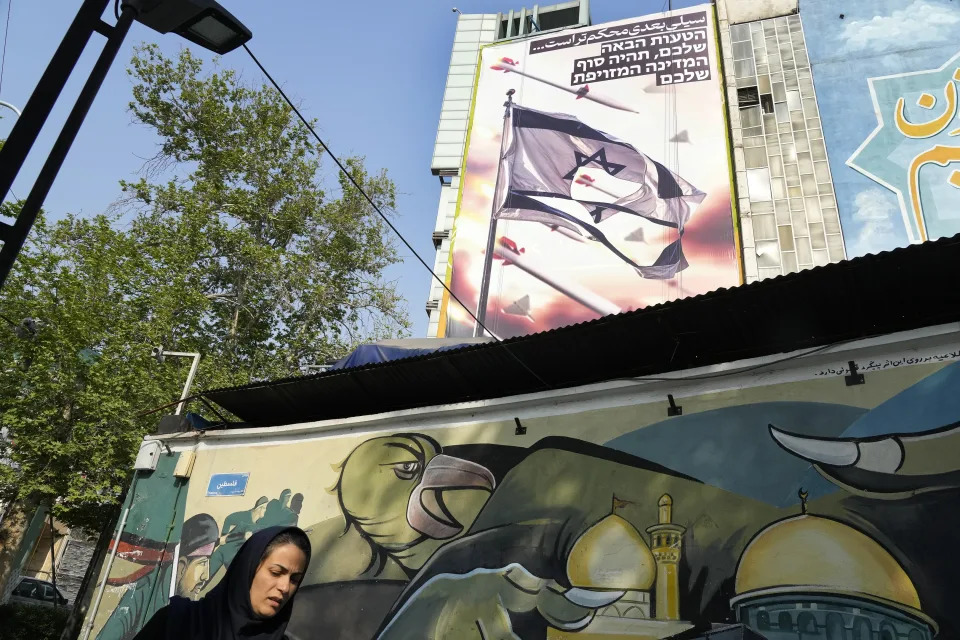Analysis: Iran upends decades of shadow warfare in direct attack on Israel as tensions mount at home

Iran's direct attack on Israel over the weekend upended decades of its shadowy warfare by proxy, something Tehran has used to manage international repercussions for its actions. But with both economic and political tensions at home boiling, the country's Shiite theocracy chose a new path as changes loom for the Islamic Republic.
A woman walks past an anti-Israeli banner on a building at the Felestin (Palestine) Square in downtown Tehran, Iran, Sunday, April 14, 2024. Israel on Sunday hailed its air defenses in the face of an unprecedented attack by Iran, saying the systems thwarted 99% of the more than 300 drones and missiles launched toward its territory. The sign in Hebrew reads: "Your next mistake will be the end of your fake country." The sign in Farsi reads: "The next slap will be harder."
Supreme Leader Ayatollah Ali Khamenei will mark his 85th birthday Friday, with no clear successor in sight and still serving as the final arbiter of every decision Iran makes. Coming to power in the wake of Iran’s devastating eight-year war with Iraq in the 1980s, Khamenei preached for years about “strategic patience” in confronting his government's main rivals, Israel and the United States, to avoid open combat.
That saw Iran invest more deeply in regional militia forces to harass Israel — such as Hamas in the Gaza Strip or Lebanon's Hezbollah militia — and contain the U.S., like with the militias that planted devastating improvised explosives that killed American troops during the Iraq war. That's extended even into impoverished Yemen, where Iran's arming of the Houthi rebels empowered their takeover of the capital and checkmated a Saudi-led coalition still trapped in a yearslong war there.
That strategy changed Saturday. After days of warnings, Iran launched 170 bomb-carrying drones, more than 30 cruise missiles and more than 120 ballistic missiles toward Israel, according to an Israeli count. Those weapons included the same bomb-carrying drones Iran supplied to Russia for its grinding war on Ukraine.
Despite Israel and the U.S. describing 99% of those projectiles being shot down, Iran has called the attack a success. Iranian Foreign Minister Hossein Amirabdollahian said Monday the attack was “to deter, punish and warn the Zionist regime.” Khamenei himself had called for Iran to “punish” Israel as well.
The trigger for the attack came April 1, when a suspected Israeli strike hit a consular annex building by Iran's Embassy in Damascus, Syria, killing at least 12, including a top commander of Iran's paramilitary Revolutionary Guard's expeditionary Quds Forces.
However, for years, Iran and Israel have been targeting each other’s interests across the Middle East.
Israel is suspected of assassinating Iranian nuclear scientists and sabotaging atomic sites in the Islamic Republic. In Syria, Israel has repeatedly bombed airports likely to interrupt Iranian weapons shipments, as well as killed other Guard officers. Meanwhile, Iran is suspected of carrying out a host of bombings and gun attacks targeting Jews and Israeli interests over the decades.
But the embassy attack struck a nerve with the Iranian government.
“Attacking our consulate is like attacking our soil," Khamenei said April 10.
It also comes amid a moment filled with uncertainty for Iran. As Khamenei grows older, power has become ever-more consolidated in the country.
Hard-liners control every lever of power within both security services and political bodies, with none of the relative moderates who once shepherded Iran's nuclear deal with world powers into existence.
That includes former President Hassan Rouhani, who led the effort. Authorities barred Rouhani earlier this year from running again to hold his seat on the Assembly of Experts, the 88-cleric body that will pick Iran's next supreme leader.
The hard-liners' grip on power has seen voter turnout drop to its lowest level since the 1979 Islamic Revolution. Their stranglehold also leaves them as the only political faction to blame as the public remains incensed by Iran's collapsing economy.
The nuclear deal's demise, after former President Donald Trump unilaterally withdrew America from the accord in 2018, has seen Iran's rial currency tumble. The rial now seesaws near record lows, trading Monday at 658,000 to the dollar — down from 32,000 at the time the agreement was reached nearly a decade ago.
Already, prosecutors in Tehran have begun a criminal investigation into the Jahan-e Sanaat newspaper and a journalist over a story on the possible economic impact of Iran's attack on Israel. The judiciary's Mizan news agency described the report as “disturbing the psychological security of society and making the country’s economic atmosphere turbulent."
His case comes as other journalists and activists report being summoned by authorities, portending a new crackdown on any sign of dissent in the country.
There are also signs that authorities appear to be preparing for a new push at enforcing the country's mandatory headscarf, or hijab, laws for women.
"The Tehran police — as in all other provinces — will start to confront all lawbreaking with regard to the hijab,” said Tehran police chief Brig. Gen. Abbas Ali Mohammadian, according to the semiofficial ISNA news agency.
Some women in Tehran still walk through the streets with their hair uncovered, a continued protest since the nationwide 2022 demonstrations over the death of Mahsa Amini, arrested by police for not wearing a hijab to their liking. United Nations investigators say Iran was responsible for Amini's death and violently put down largely peaceful protests in a monthslong security crackdown that killed more than 500 people and saw over 22,000 detained.
A new push for hijab enforcement may reignite that anger, particularly in Tehran. Meanwhile, rumors persist that the government may soon raise the country's heavily subsidized gasoline prices. A price increase in 2019 grew into nationwide antigovernment protests that reportedly saw over 300 people killed and thousands arrested.
Those tensions, coupled with hard-liners' grip on power and Khamenei's age, signal more changes loom for the country. And while Iran said of its attack Saturday that “the matter can be deemed concluded” even before missiles reached Israel, that doesn't mean there won't be further retaliation from the country.
Something to celebrate? How is the Israel attack viewed in Iran?
Iran's first direct military confrontation with Israel on Saturday did not come as a surprise to some.
Iranian Supreme Leader Ayatollah Ali Khamenei himself warned Israel would "be slapped", following a suspected Israeli airstrike on an Iranian consular building in Syria earlier this month.
Still, the fallout from the strike - which saw Tehran launch more than 300 drones, ballistic and cruise missiles at Israel - is no less concerning for Iran's population.
While state media depict mass celebrations, a significant portion of the public is deeply concerned about the economic fallout, more internal repression and possible retaliatory action by Israel that could drag the country into war.
Iran's crisis-ridden economy
Escalating inflation and shortages of essential goods, which could worsen amid a new wave of international sanctions, have become a primary concern for Iranians in recent years.
And things could get worse owing to the strikes.
Iran's currency against the dollar, euro and pound reached a record low following the attacks, with the price of 1 US dollar hitting more than 70,000 Iranian rials for an hour on Sunday, though later decreased.

Iran's currency has lost 94 per cent of its value against the dollar over the past decade, analysis by the Economist revealed in March 2023.
This has hit peoples' standard of living hard and sunk millions into poverty as the price of imported goods, especially food, became more expensive.
While Washington is not looking to participate in Israel's possible retaliation against Iran, US President Joe Biden has called for a coordinated and diplomatic response from the G7 industrialised nations.
If the US, UK, Canada, France, Germany, Italy and Japan hit Iran's already ailing economy with sanctions, more hardship for Iran's population could follow.
Risk of internal repression
In 2022, Iran's Islamic regime saw the largest outburst of anti-government unrest in decades.
Protests were sparked by the death of Mahsa Amini after her arrest by the country's morality police for allegedly not covering her hair properly and wearing skinny jeans.
Though demonstrations have largely been suppressed, contestation still surrounds Islamic dress codes and the government has lost legitimacy in the eyes of many.
Some in Iran worry a more direct military confrontation with Israel will allow the Islamic Republic to quash internal challenges more easily under the pretext of avoiding instability or extraordinary war conditions.

Iran's government may be able to persist in its violations of human rights and enforce stricter mandatory hijab laws, which were quietly implemented yesterday but overshadowed by Iran's attack on Israel.
On Sunday, the Iranian Revoluntary Guard Corps warned it would deal with "supporters of Israel in cyberspace."
Online criticism of the Islamic Republic's regional policy and its military operation on Saturday could be considered as "supporting Israel" in this vein.
Risk of a wider war
Within Iran's population of approximately 88 million, there exists a segment supportive of the regime's foreign policies.
Some are sympathetic to the Palestinian cause and criticise what they see as harmful policies by Israel and its principal ally the US in the Middle East.
However, Iranian security forces have taken measures to suppress dissenting voices, banning newspapers and public figures from expressing any form of opposition to the attack on Israel and its aftermath.
A prevailing anxiety among Iranians is for their families and future in the event of direct conflict.

The haunting memory of the brutal eight-year war with Iraq from 1980 to 1988 - which saw some 200,000 Iranian casualties - adds weight to these concerns.
Recent trends on social media suggest a significant portion of internet users scrutinise Iran's claimed success in the attack on Israeli soil, suspecting it to be a premeditated move potentially permitted by the White House.
Another segment of opinions on social media regards the real winner of this attack to be Israeli Prime Minister Benjamin Netanyahu, who managed once again to showcase his country's defensive capabilities by neutralising 99% of Iran's drones and missiles.
Tehran's hesitancy to act against Israel with many days passing after the strike on its consular building underscores its weakness, some say.
By fending off Iran's attack, Netanyahu has demonstrated that even amidst domestic crises and increasing international criticism of Israel's actions in Gaza, Israel still possesses the necessary capability to rally the West and its allies.
The shadow war between Iran and Israel has been exposed. What happens next?
Iran’s unprecedented attack on Israel early Sunday marked a change in approach for Tehran, which had relied on proxies across the Middle East since the start of the Israel-Hamas war in October. All eyes are now on whether Israel chooses to take further military action, while Washington seeks diplomatic measures instead to ease regional tensions.
Iran says the attack was in response to an airstrike widely blamed on Israel that destroyed what Iran says were consular offices in Syria and killed two generals with its paramilitary Revolutionary Guard earlier this month.
Israel said almost all the over 300 drones and missiles launched overnight by Iran were shot down by its anti-missile defense system, backed by the U.S. and Britain. The sole reported casualty was a wounded girl in southern Israel, and a missile struck an Israeli airbase, causing light damage.
Still, the chief of Iran’s Revolutionary Guard called the operation successful.
Iran has managed to strike a balance between retaliating publicly for the strike in Damascus and avoiding provoking further Israeli military action at least initially, which could lead to a much wider conflict, said Mona Yacoubian, vice president of the Middle East and North Africa center at the U.S. Institute of Peace.
“Both (Iran and Israel) are able at this point to claim victory and step down off the precipice, particularly since there were no Israeli civilians killed,” Yacoubian said.
The world was still waiting, however, for the result of an Israeli War Cabinet meeting on Sunday. Israeli hard-liners have pushed for a response, but others have suggested restraint, saying Israel should focus on strengthening budding ties with Arab partners.
“We will build a regional coalition and collect the price from Iran, in the way and at the time that suits us,” said Benny Gantz, a member of the War Cabinet.
Analysts say Iran sent a message that it would be willing to escalate and change its rules of engagement in its shadow war with Israel.
“It’s a warning shot, saying that if Israel breaks the rules, there are consequences,” said Magnus Ranstorp, strategic adviser at the Swedish Defense University.
Iran’s attack has further stoked fears of the war in Gaza causing regional havoc.
But Iran maintains that it does not seek all-out war across the region. Foreign Minister Hossein Amirabdollahian said in a post on X, formerly Twitter, that Iran has “no intention of continuing defensive operations” at this point unless it is attacked.
Iran stressed that it targeted Israeli facilities involved in the Damascus attack, not civilians or “economic areas.”
After Israel began its offensive in Gaza against Hamas, Iran-backed groups were involved militarily while Tehran sat on the sidelines. Lebanon’s Hezbollah group fired rockets into northern Israel. Yemen’s Houthi rebels attacked Western ships on the Red Sea. An umbrella group of Iran-backed Iraqi militias attacked U.S. military positions in Iraq and Syria.
Now, Tehran is “willing to up the ante” without relying on proxies, said the director of the Carnegie Middle East Center, Maha Yahya.
Still, Iran only went so far.
“They gave enough warning that this was coming, and I think they knew that they (the drones and missiles) would be brought down before they reached Israeli territory,” Yahya said.
She also noted that the recent mounting pressure on Israel over its conduct in Gaza has now shifted to deescalating regional tensions instead.
Yacoubian says Washington has a critical role to play in avoiding further escalations.
Israel taking further military action does not seem popular among its allies including the United States, said Eldad Shavit, who heads the Israel-U.S. Research Program at Israeli think tank the Institute for National Security Studies.
White House national security spokesman John Kirby told NBC that President Joe Biden does not want an escalation in the regional conflict or a “wider war” with Iran, and is “working on the diplomatic side of this personally.”
Urgent meetings of the G7 — the informal gathering of industrialized countries that includes the United States, United Kingdom, and France — and the U.N. Security Council were being held Sunday.
G7 meeting participants in a statement unanimously condemned Iran's attack, saying “we stand ready to take further measures now and in response to further destabilizing initiatives.”
- Questions and Answers
- Opinion
- Story/Motivational/Inspiring
- Technology
- Art
- Causes
- Crafts
- Dance
- Drinks
- Film/Movie
- Fitness
- Food
- Games
- Gardening
- Health
- Home
- Literature
- Music
- Networking
- Other
- Party
- Religion
- Shopping
- Sports
- Theater
- Wellness
- News
- Culture
- War machines and policy



